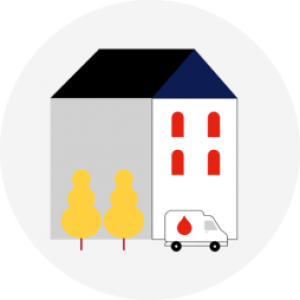Lifeblood and blood donors are stepping up to fight cancer
Close to 20,000 Australians will be newly diagnosed with a form of blood cancer this year.
So, Westmead Institute of Medical Research’s Bone Marrow Transplant and Cell Therapies Group are working to improve treatments — and we’re doing what we can to help.
A bit about cancer
It’s a huge topic, so let’s just go over the basics.
Cancer affects cells — whether it’s breast tissue, blood cells, or one of the many other types of cancer. Cancer cells are abnormal cells which multiply in a way regular cells don’t, and they often hide in plain sight.
In the words of Justine O’Donovan, a Clinical Research Nurse Consultant at Lifeblood, “Cancer cells are clever. They find ways to avoid our immune systems.”
Traditional treatments like chemotherapy and immunotherapy aim to contain cancer cells, but they often have serious side effects which can be debilitating.
A new way to treat blood cancer
The Westmead team are well known for their innovative work. They’re working with a treatment called CAR-T cell therapy. It’s when a person’s own immune cells, or those of a matched donor, are “trained” to attack specific cancer cells.
“The use of living cells in the treatments they’re developing means that treatments can be tailored to target specific blood cancers and viruses while leaving healthy cells alone,” says Justine.
Prof David Gottlieb is leading a study at Westmead for patients who have received a bone marrow transplant. A particular type of white cell known as T lymphocytes will be extracted from blood from the patient’s original bone marrow donor to reduce the risk of the patient rejecting the cells. The cells collected from the blood donation are modified at Westmead, so they produce cancer specific antibodies that then seek and destroy cancer cells. Researchers hope that these cells will then continue to multiply, identifying and destroying cancer cells, keeping them in check.
Pretty incredible, isn’t it?
And there’s more where that came from. Prof Emily Blyth and her team use T-cells from people who have recovered from COVID-19 to help others with weakened immune systems fight off COVID infections — they’re armed with transplanted T-cells!
We play a vital role — and so do you.
“CAR T-cell therapy offers hope when other treatment options have failed. By contributing to this work, Lifeblood aims to support saving lives and reduce the burden of cancer in Australia,” – Justine O’Donovan
None of this work would be possible without healthy donors and study participants.
Then, it’s our job to efficiently collect blood and get it to Westmead as fast as possible.
Justine and her team’s work with Westmead is just one project Lifeblood is involved in. Whether it’s research into how climate change affects blood donation, potential applications of donor microbiota to treat mental illness, or countless other areas of study we’re involved in, we challenge the limits of our knowledge, uncover new discoveries and change lives for the better.

